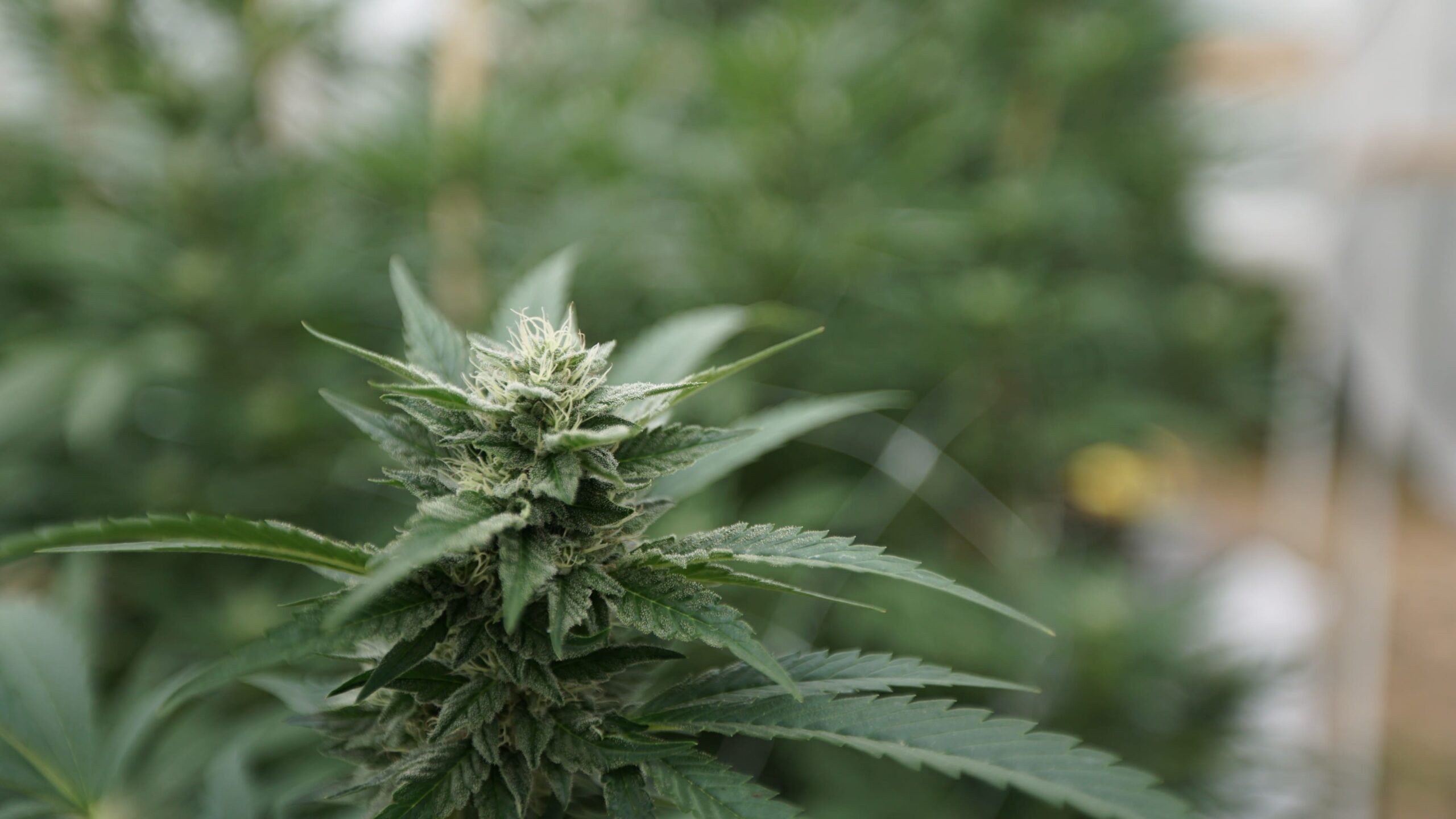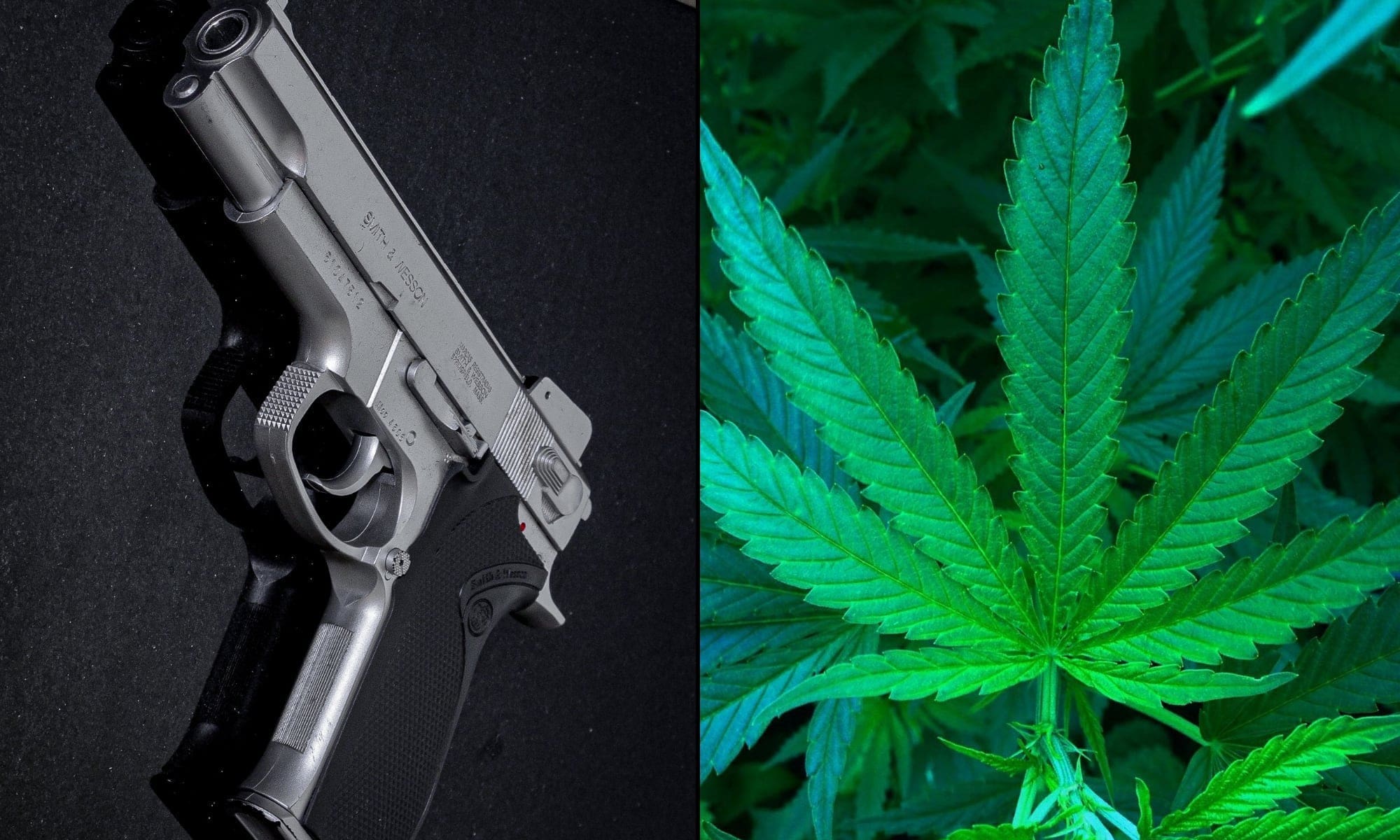featured
Cannabis industry case challenging prohibition hits Supreme Court (Newsletter: October 27, 2025)
Published
7 hours agoon

Hemp dispute in Congress; TX medical marijuana expansion; KY medical cannabis update; Study: More Americans use marijuana than cigarettes
Subscribe to receive Marijuana Moment’s newsletter in your inbox every weekday morning. It’s the best way to make sure you know which cannabis stories are shaping the day.
Your support makes Marijuana Moment possible…
Your good deed for the day: donate to an independent publisher like Marijuana Moment and ensure that as many voters as possible have access to the most in-depth cannabis reporting out there.
Support our work at https://www.patreon.com/marijuanamoment
/ TOP THINGS TO KNOW
Marijuana companies filed a petition asking the U.S. Supreme Court to take up their lawsuit that seeks to block the enforcement of federal prohibition against their state-legal activities.
As Congress considers how to address hemp through pending appropriations legislation, state attorneys general are circulating a letter asking lawmakers to “ensure intoxicating THC products are taken off the market” and Sen. Rand Paul (R-KY) is supporting language to study “best practices” on state regulation.
Kentucky Gov. Andy Beshear (D) announced that the state now has 15,000 registered medical cannabis patients and that by next week regulators will have approved businesses in every category—completing the “full process cycle from cultivation to dispensary.”
The Texas Department of Public Safety adopted changes to medical cannabis rules to expand patient access by licensing additional dispensaries and setting security requirements for satellite locations.
A new study shows that more Americans now use marijuana than smoke cigarettes—”suggesting possible substitution driven by changing harm perceptions, evolving legislation and shifting norms.”
- “Cigarette-only use declined, while cannabis-only use increased across nearly all sociodemographic groups.”
The Michigan House Regulatory Reform Committee held a hearing on bills to change legal marijuana possession limits and alter rules for addressing cannabis industry violations.
South Dakota cannabis reform advocates expressed alarm after a meeting of the legislature’s Medical Marijuana Oversight Committee gave prohibitionists a platform—stoking fears the panel is part of a coordinated effort to restrict or repeal patient access.
The Oregon Health Authority is seeking to dismiss a lawsuit alleging that the state’s psilocybin program discriminates against homebound disabled patients who can’t travel to licensed psychedelic services centers.
Former Idaho Attorney General Jim Jones (R) argues in a new op-ed that the Trump administration’s attacks on suspected drug boats are a “stupid tactic because it destroys the evidence and does not allow for interrogation of the suspects” while also putting military officers “in an untenable position.”
/ FEDERAL
President Donald Trump hosted a roundtable meeting on his administration’s efforts to combat drug cartels, saying he will not seek congressional authorization for military strikes on suspected traffickers.
Several Republican senators are raising questions about the Trump administration’s military attacks on suspected drug boats.
The House bill to federally legalize marijuana got one new cosponsor for a total of 57.
/ STATES
Montana Gov. Greg Gianforte (R) discussed a program to use marijuana revenue to fund drug treatment that he supports, saying, “I felt if we are going to hand out a Schedule 1 drug, we might as well use revenues to pay for addiction recovery.”
The Georgia House Blue-Ribbon Study Committee on Georgia’s Medical Marijuana and Hemp Policies held its final meeting.
New York regulators’ request for the U.S. Court of Appeals for the Second Circuit to reconsider a lower court’s ruling on residency privileges in marijuana licensing was rejected.
Tennessee regulators entered into an agreed declaratory order clarifying the regulatory framework for hemp-derived cannabinoid product businesses during the transition to new state regulations.
Arizona regulators announced a recall of marijuana products due to possible contamination with aspergillus.
Ohio regulators announced recalls of medical cannabis products that aren’t marked with a universal THC symbol on each serving and that failed pesticide testing.
Oklahoma regulators announced a recall of medical cannabis products due to improper testing methods.
Washington, D.C. regulators proposed changes to medical cannabis rules.
Minnesota’s top marijuana regulator acknowledged frustration that dispensaries are expressing about product availability.
Maryland regulators posted guidance about marijuana business inspections.
—
Marijuana Moment is tracking hundreds of cannabis, psychedelics and drug policy bills in state legislatures and Congress this year. Patreon supporters pledging at least $25/month get access to our interactive maps, charts and hearing calendar so they don’t miss any developments.![]()
Learn more about our marijuana bill tracker and become a supporter on Patreon to get access.
—
/ LOCAL
The 143rd Judicial District, Texas district attorney is facing a lawsuit seeking to remove her from office over accusations she has refused to enforce drug laws amid a viral video she posted of herself smoking marijuana.
/ INTERNATIONAL
The International Criminal Court rejected former Philippine President Rodrigo Duterte’s challenge to its jurisdiction in a prosecution related to killings in the nation’s bloody “war on drugs.”
German officials increased the amount of allowable cannabis imports for medical and scientific purposes.
/ SCIENCE & HEALTH
A review concluded that “cannabinoids provide modest, condition-specific analgesia and should be considered adjunctive rather than first-line options, reserved for patients unresponsive to conventional therapy.”
A study found that “group psilocybin-assisted therapy plus [Mindfulness-Based Stress Reduction] was associated with clinically significant improvement in depressive symptoms without serious [adverse events] and with greater reduction in symptoms than MBSR alone.”
/ BUSINESS
atai Life Sciences and Beckley Psytech Limited announced that the Food and Drug Administration granted Breakthrough Therapy designation to their 5-MeO-DMT benzoate nasal spray for adult patients with treatment-resistant depression.
Canadian retailers sold C$498.7 million worth of legal marijuana products in August.
Make sure to subscribe to get Marijuana Moment’s daily dispatch in your inbox.
Photo courtesy of Chris Wallis // Side Pocket Images.

Author: mscannabiz.com
MScannaBIZ for all you Mississippi Cannabis News and Information.
You may like
-


Now Is the Time to Embrace, Not Abandon, Cannabis Activism
-


No One Is Giving Your Kids Marijuana Edibles in Their Halloween Candy
-


Florida Case On Medical Marijuana Patients’ Gun Rights Is On Hold As Supreme Court Weighs Underlying Issue
-


CULTA Appoints Cannabis Industry Veteran Joseph Andreae as CEO
-


The Creature from the Black Leather Lagoon
-


I Worked a Day as a Budtender in Brooklyn: Here’s What I Learned
featured
Now Is the Time to Embrace, Not Abandon, Cannabis Activism
Published
31 minutes agoon
October 27, 2025
This article originally appeared in High Times Magazine’s 50th Anniversary Print Issue. Order yours here and get it delivered to your door.
Political and societal changes rarely occur organically. They only happen when advocates agitate for them.
For over five decades, NORML and its grassroots supporters have advocated for ending the criminalization, discrimination, and stigmatization of cannabis consumers. We have been deliberate and diligent in our efforts to change the way people talk and think about the marijuana plant and those who consume it.
It’s been – and it remains – an uphill battle. Our movement challenges powerful special interests, like law enforcement. Our work is deeply underfunded. Our advocates are often underrepresented in the mainstream media and in the political arena. But we are winning nonetheless because our message is irrefutable: It makes no sense from a public health perspective, a fiscal perspective, or a moral perspective to arrest, prosecute, and incarcerate adults who choose to responsibly consume a substance that is objectively safer than either alcohol or tobacco.
Also read: Want Clean, Safe Cannabis? Home Grow And Legal Access Are The Answer
At the time of NORML’s founding, only about one in ten Americans believed that cannabis should be legal. Today, 70 percent of Americans support legalization. There are several reasons for this dramatic shift in public opinion. One: the devastating effects of prohibition – including the arrest of over 30 million Americans, disproportionately young and poor people, for violating marijuana possession laws – have been laid bare for all to see. Two: the successes of legalization – including the public health benefits provided by the growing acceptance of medical cannabis and the economic benefits provided by regulated markets – have become impossible to deny. As more jurisdictions have moved to legalize the plant for either therapeutic or recreational purposes, public support for these policies has increased exponentially. In short, the more the public has first-hand experience with legalization, the more they like it.
But just because we have won the hearts and minds of the public doesn’t mean that we have successfully won the legalization battle. In fact, in some respects, it’s made our fight that much harder.
Many supporters now believe, falsely, that nationwide legalization is some sort of fait accompli and therefore, there’s no longer a need for grassroots advocacy. This perception is woefully incorrect. Our political and cultural opponents have not gone away. In many cases, they have regrouped and re-strategized. Knowing that their side has lost the war of ideas, they’ve pivoted to targeting democracy itself – at times attacking and undermining the ballot initiative process, in other instances, overturning marijuana-related election results they disapprove of. In jurisdictions where cannabis is legal, they are chipping away at consumers’ hard-won freedoms by lobbying for arbitrary potency limits (which would re-criminalize certain cannabis products as well as those who produce and consume them), pushing for artificially high sale taxes, and calling on cities and towns to impose bans on marijuana-related businesses.
Also read: Debunking Pot Potency Hysteria: The Truth About ‘Super-Strong’ Weed
Others presume that the corporate cannabis industry can sufficiently and successfully carry our movement to the next level. This is wishful thinking. While some players in the commercial cannabis space do provide limited financial support for grassroots activism, most cannot or do not. More concerningly, the interests of the cannabis industry do not always align with those of consumers. Issues that matter most to the cannabis community, such as securing home cultivation rights, expunging past criminal convictions, ending workplace discrimination, and strengthening parental rights, often get short shrift from industry players – who are far more likely to utilize their resources to lobby for changes in corporate tax codes and industry-specific regulations. In this vacuum, it is critical that activist groups like NORML and other grassroots organizers ensure that consumers’ voices, rather than corporate interests, remain prominent in the ongoing public policy debate. After all, there is no cannabis industry without cannabis consumers.
Finally, it goes without saying that our movement’s objectives are not met until federal cannabis prohibition is repealed. Despite most states having now legalized cannabis, all these policies – and more importantly, those who provide and consume cannabis under these laws – are in violation of federal law and remain in jeopardy of potential federal prosecution. This fact won’t change until the cannabis plant is removed from the federal Controlled Substances Act entirely. Reclassifying cannabis to a lower status, like Schedule III, is not a sufficient long-term solution and, in fact, it will perpetuate the growing divide between state and federal marijuana policies. For states to truly legalize cannabis without the threat of undue federal interference, the government must abandon its long-standing ‘Flat Earth’ policies once and for all. In short, the need for grassroots consumer-driven advocacy is more important than ever. Now is not the time for the cannabis community to rest on the laurels of its past successes or to presume that someone else is going to finish the job. Historically, it’s been the efforts of dedicated advocacy groups like NORML (along with longtime ally High Times) that have represented our culture and demanded that it be recognized and respected. Ultimately, it is this same activist community that must continue to lead this fight, and it is our community that will ultimately liberate the cannabis plant and cannabis consumers from the shackles of prohibition.
This article originally appeared in High Times Magazine’s 50th Anniversary Print Issue. Order yours here and get it delivered to your door.
Paul Armentano is the Deputy Director of the National Organization for the Reform of Marijuana Laws, America’s oldest cannabis consumers’ lobby. To become a member of NORML or to support NORML’s efforts, please consider making a donation here.
Photo by Luis Quintero on Unsplash

Author: mscannabiz.com
MScannaBIZ for all you Mississippi Cannabis News and Information.
featured
No One Is Giving Your Kids Marijuana Edibles in Their Halloween Candy
Published
2 hours agoon
October 27, 2025

It’s Halloween season, which means it’s time for your local news outlets to once again warn viewers about a virtually non-existent threat: the notion that there are large groups of insidious people just waiting to give your trick-or-treating children free cannabis edibles. This is one of those marijuana myths that keeps coming back from the dead every time the pumpkins start popping up on your neighbors’ doorsteps.
No one is knowingly giving out edibles to children as Halloween candy. First, doing so would be grossly irresponsible. NORML’s longstanding ‘Principles of Responsible Cannabis Use’ specify that cannabis is for “adults only” and that consumers “do not violate the rights of others.” Second, it would be cost-prohibitive. Regulated cannabis products cost exponentially more than traditional candy. Third, doing so exposes would-be pranksters to serious criminal penalties, as distributing cannabis to minors is a felony offense in almost all circumstances. Fourth, legal state-regulated cannabis products are subject to strict packaging laws that make them readily distinguishable from traditional candy, as well as from irresponsibly packaged unregulated products. For these reasons, there are few, if any, reports of this happening in the real world, only in the minds of ratings-crazed newsrooms and fear-mongering prohibitionists.
There will always be a very small number of people with malicious intentions and, as a result, parents should always check their kids’ Halloween haul to ensure that their treats are safe and appropriate. That goes without saying. But there’s no data to support the unfounded claims that the statewide regulation of either adult-use or medical-use cannabis products is unduly putting children’s safety at risk — not on Halloween or any other day of the year. In fact, over the past decade, marijuana use by teens has fallen to historic lows.
Writing for NBC News, journalist Simon Moyer-Smith said it best:
“Halloween, of course, is a time of fear: ghouls, goblins, haunted houses and the sheer volume of leftover candy that will be around to tempt you. But it’s not a time to stoke fear about things that aren’t based in evidence and truth — and definitely not a time to demonize marijuana yet again.
… No one, absolutely no one, will be handing out marijuana edibles en masse to unsuspecting minors this Halloween. … If you want to be scared of something on Halloween night, it shouldn’t be edibles in your kid’s treat bag but drunken drivers on the road.
… So fear demons, drunk drivers and Dum Dums, but there’s no need to worry that edibles will be given out willy-nilly to trick-or-treaters on Halloween.”
So go ahead NORML Nation, have a fun, safe, and evidence-based Halloween – and of course, enjoy your edibles responsibly and keep them safely out of the hands of children.
Related

Author: mscannabiz.com
MScannaBIZ for all you Mississippi Cannabis News and Information.
featured
Florida Case On Medical Marijuana Patients’ Gun Rights Is On Hold As Supreme Court Weighs Underlying Issue
Published
3 hours agoon
October 27, 2025
A federal court has agreed to delay proceedings in a years-long Florida-based case challenging the constitutionality of the ban on gun ownership by people who use medical marijuana, with the Justice Department arguing that the U.S. Supreme Court’s recent decision to take up a related dispute warrants a stay in the lower court.
The Supreme Court accepted a petition for cert for the separate case, U.S. v. Hemani, last week to settle the question of whether the ban—known as Section 922(g)(3)—is consistent with the Second Amendment.
With that potentially precedent-setting judgement now pending, DOJ submitted a motion—which was unopposed by the plaintiffs—requesting that the U.S. District Court for the Northern District of Florida hold the matter at least until “the Supreme Court’s resolution” in Hemani.
The Trump administration further said a pause in the proceedings is necessary due to the government shutdown, which has deprived DOJ of resources and prohibits the agency’s attorneys “from working except in certain limited circumstances.”
“Granting a stay would promote judicial economy and the efficient use of resources of the Court and the parties,” it said. “The resolution of Hemani will almost certainly have a significant impact on this case. The Supreme Court’s ruling on the constitutionality of § 922(g)(3) will likely shed significant light on the viability of Plaintiffs’ claims here and what factual development, if any, is necessary to determine whether the application of § 922(g)(3) is constitutional as applied to Plaintiffs.”
Chief U.S. District Judge Allen Winsor agreed in a brief order issued on Thursday.
“Defendants’ unopposed motion to stay pending resolution of United States v. Hemani (ECF No. 41) is GRANTED. This case is STAYED, and all deadlines are suspended,” he wrote. “Any party may move to lift the stay at any time.”
The plaintiffs in the Florida case are Vera Cooper and Nicole Hansell, who are registered medical cannabis patients denied gun purchases over their admission to participating in the program, and Neill Franklin, a former police officer who wants to access medical marijuana without jeopardizing his right to own a firearm.
In August, a three-judge panel of the U.S. Court of Appeals for the Eleventh District, in a opinion authored by Judge Elizabeth Branch, departed from the district court’s earlier ruling that upheld Section 922(g)(3). It was a win for the plaintiffs, though the case was remanded back to the lower court and remains unsettled.
Former Florida Agriculture Commissioner Nikki Fried (D) initially led the suit against the federal government, but she was removed from the case after leaving her state office. The Republican commissioner who replaced her declined to become involved in the legal proceedings. Fried is now chair of the Florida Democratic Party.
While the Supreme Court last Monday also declined to take up a separate case on cannabis consumers’ gun rights, there are still several others pending a decision from the justices. But the choice to take up Hemani in particular is likely welcome news to the Justice Department, which has consistently defended the firearm prohibition and specifically requested that SCOTUS review that case instead of alternatives.
That could be related to the fact that the defendant is not only a marijuana consumer but also a user of cocaine who’s sold drugs in the past, so it’s possible DOJ reasoned that he is a less sympathetic face for the issue. Defendants in the other cases were merely found in possession of both a firearm and marijuana.
In June, U.S. Solicitor General D. John Sauer, an appointee of President Donald Trump, submitted a filing with the Supreme Court that said “Section 922(g)(3) complies with the Second Amendment,” and the statute “targets a category of persons who pose a clear danger of misusing firearms: habitual users of unlawful drugs.”
The law “bars their possession of firearms only temporarily and leaves it within their power to lift the restriction at any time; anyone who stops habitually using illegal drugs can resume possessing firearms,” Sauer said.
Notably, while the government mentions “habitual” users of illegal drugs 40 times in its filing, that word does not itself appear in 922(g)(3). The language of the statute prohibits anyone “who is an unlawful user of or addicted to any controlled substance” from purchasing or possessing firearms or ammunition.
In a separate August filing for the case, the Justice Department also emphasized that “the question presented is the subject of a multi-sided and growing circuit conflict.” In seeking the court’s grant of cert, the solicitor general also noted that the defendant is a joint American and Pakistani citizen with alleged ties to Iranian entities hostile to the U.S., putting him the FBI’s radar.
The court also recently denied a petition for cert in another gun and marijuana case, U.S. v. Baxter, but that wasn’t especially surprising as both DOJ and the defendants advised against further pursing the matter after a lower court reinstated his conviction for being an unlawful user of a controlled substance in possession of a firearm.
A number of federal courts in recent years have cast doubt on the legality of § 922(g)(3), finding generally that while the ban on gun ownership among drug users may not be entirely unconstitutional, there’s scant historical precedent for such a broad restriction of Second Amendment rights on an entire a category of people.
Meanwhile, in recent interviews with Marijuana Moment, several Republican senators shared their views on the federal ban on gun possession by people who use marijuana—with one saying that if alcohol drinkers can lawfully buy and use firearms, the same standard should apply to cannabis consumers.
Separately, the U.S. Court of Appeals for the Tenth Circuit last month sided with a federal district court that dismissed an indictment against Jared Michael Harrison, who was charged in Oklahoma in 2022 after police discovered cannabis and a handgun in his vehicle during a traffic stop.
The case has now been remanded to that lower court, which determined that the current statute banning “unlawful” users of marijuana from possessing firearms violates the Second Amendment of the Constitution.
The lower court largely based his initial decision on an interpretation of a Supreme Court ruling in which the justices generally created a higher standard for policies that seek to impose restrictions on gun rights.
The ruling states that any such restrictions must be consistent with the historical context of the Second Amendment’s original 1791 ratification.
The historical analogues that the Justice Department relied on to make the case that the ban is consistent included references to antiquated case law preventing Catholics, loyalists, slaves and Indians from having guns.
The circuit court, for its part, said that “the government must show non-intoxicated marijuana users pose a risk of future danger” to support the current policy. “This inquiry, which may involve fact finding, is best suited for the district court.”
As a recent report from the Congressional Research Service (CRS) explained the current legal landscape, a growing number of federal courts are now “finding constitutional problems in the application of at least some parts” of the firearms prohibition.
In a recent ruling, a three-judge panel for the U.S. Court of Appeals for the Eighth Circuit vacated a defendant’s conviction and remanded the case back to a district court, noting that a retrial before a jury may be necessary to determine whether cannabis in fact caused the defendant to be dangerous or pose a credible threat to others.
The Third Circuit separately said in a published opinion that district courts must make “individualized judgments” to determine whether 922(g)(3) is constitutional as applied to particular defendants.
—
Marijuana Moment is tracking hundreds of cannabis, psychedelics and drug policy bills in state legislatures and Congress this year. Patreon supporters pledging at least $25/month get access to our interactive maps, charts and hearing calendar so they don’t miss any developments.![]()
Learn more about our marijuana bill tracker and become a supporter on Patreon to get access.
—
Earlier this year, a federal judge in Rhode Island ruled that the ban was unconstitutional as applied to two defendants, writing that the government failed to establish that the “sweeping” prohibition against gun ownership by marijuana users was grounded in historical precedent.
A federal judge in El Paso separately ruled late last year that the government’s ongoing ban on gun ownership by habitual marijuana users is unconstitutional in the case of a defendant who earlier pleaded guilty to the criminal charge. The court allowed the man to withdraw the plea and ordered that the indictment against him be dismissed.
DOJ has claimed in multiple federal cases over the past several years that the statute banning cannabis consumers from owning or possessing guns is constitutional because it’s consistent with the nation’s history of disarming “dangerous” individuals.
In 2023, for example, the Justice Department told the U.S. Court of Appeals for the Third Circuit that historical precedent “comfortably” supports the restriction. Cannabis consumers with guns pose a unique danger to society, the Biden administration claimed, in part because they’re “unlikely” to store their weapon properly.
Meanwhile, some states have passed their own laws either further restricting or attempting to preserve gun rights as they relate to marijuana.
Recently a Pennsylvania lawmaker introduced a bill meant to remove state barriers to medical marijuana patients carrying firearms.
Colorado activists also attempted to qualify an initiative for November’s ballot that would have protected the Second Amendment rights of marijuana consumers in that state, but the campaign’s signature-gathering drive ultimately fell short.
As 2024 drew to a close, the ATF issued a warning to Kentucky residents that, if they choose to participate in the state’s medical marijuana program that’s set to launch imminently, they will be prohibited from buying or possessing firearms under federal law.
The official said that while people who already own firearms aren’t “expected to” turn them over if they become state-legal cannabis patients, those who “wish to follow federal law and not be in violation of it” must “make the decision to divest themselves of those firearms.”
Since then, bipartisan state lawmakers have introduced legislation that would urge Kentucky’s representatives in Congress to amend federal law to clarify that users of medical marijuana may legally possess firearms, though no action has since been taken on that bill.
Kentucky Gov. Andy Beshear (D) said in January that he supported the legislature’s effort to urge the state’s congressional delegation to call for federal reforms to protect the Second Amendment rights of medical marijuana patients, but the governor added that he’d like to see even more sweeping change on the federal level.
Read the ruling and motion for a stay of the Florida medical marijuana and gun case below:

Author: mscannabiz.com
MScannaBIZ for all you Mississippi Cannabis News and Information.

Now Is the Time to Embrace, Not Abandon, Cannabis Activism

No One Is Giving Your Kids Marijuana Edibles in Their Halloween Candy

Florida Case On Medical Marijuana Patients’ Gun Rights Is On Hold As Supreme Court Weighs Underlying Issue

CULTA Appoints Cannabis Industry Veteran Joseph Andreae as CEO

The Creature from the Black Leather Lagoon

Cannabis industry case challenging prohibition hits Supreme Court (Newsletter: October 27, 2025)

I Worked a Day as a Budtender in Brooklyn: Here’s What I Learned

Trump’s ‘Stupid’ Drug War Killings Put Military In Untenable Position, Former GOP Attorney General Of Idaho Says (Op-Ed)

Oregon Officials Seek To Dismiss Psilocybin Access Lawsuit From Homebound Patients

South Dakota Medical Marijuana Advocates Alarmed After Lawmakers Give Prohibitionists A Platform

What Levi Strauss Can Teach Us About Craft and Cannabis

Michigan Lawmakers Consider Bills To Change Legal Marijuana Possession Limits And Alter Industry Disciplinary Rules

Bad Stoner Horror: The 10 Worst-Rated 420 Scary Movies

Vee the Traveling Cannabis Writer Unveils First Book in Cannabis Legacy Series – Ganjapreneur

[Video] G Herbo: Snoop Rolled My Blunt and Let Me Hit It, Smoking A Zip a Day, Chicago Munchies (Weird) and What’s Next

Marijuana Companies Ask U.S. Supreme Court To Take Up Case Challenging Constitutionality Of Federal Prohibition

The Odds Of The Feds Making A 2025 Cannabis Change

The Epic High Times Cannabis Cup Journey, From Amsterdam to the Empire State

GOP Senator Pushes To Study—Rather Than Ban—Hemp Products, As State Attorneys General Call For THC Prohibition

Happy International Champagne Day – The Fresh Toast

Maryland Police Want To Watch You Smoke Weed: Free Munchies and Ride Home Included

More Americans Now Use Marijuana Than Smoke Cigarettes, New Study Shows

Unexpected Pleasures of Weed: The Strain That Turned My Husband Into a Clean Freak

Texas Officials Adopt Rules To Expand Number Of Medical Marijuana Dispensaries In the State

Alert: Department of Cannabis Control updates data dashboards with full data for 2023

Connecticut Appoints The US’s First Cannabis Ombudsperson – Yes there is a pun in there and I’m Sure Erin Kirk Is Going To Hear It More Than Once!

5 best CBD creams of 2024 by Leafly

Recreational cannabis on ballot for third time in South Dakota

EU initiative begins bid to open access to psychedelic therapies
New Study Analyzes the Effects of THCV, CBD on Weight Loss

Free delta-9 gummies from Bay Smokes

5 best autoflower seed banks of 2024 by Leafly

Discover New York’s dankest cannabis brands [September 2024]

May 2024 Leafly HighLight: Pink Runtz strain

Press Release: CANNRA Calls for Farm Bill to Clarify Existing State Authority to Regulate Hemp Products

5 best THC drinks of 2024 by Leafly

Local medical cannabis dispensary reacts to MSDH pulling Rapid Analytics License – WLBT

6 best CBD gummies of 2024 by Leafly

Curaleaf Start Process Of Getting Their Claws Into The UK’s National Health System – With Former MP (Resigned Today 30/5/24) As The Front Man

Horn Lake denies cannabis dispensary request to allow sale of drug paraphernalia and Sunday sales | News

5 best delta-9 THC gummies of 2024 by Leafly

The Daily Hit: October 2, 2024

Mississippi city official pleads guilty to selling fake CBD products

Nevada CCB to Accept Applications for Cannabis Establishments in White Pine County – “Only one cultivation and one production license will be awarded in White Pine County”

5 best THCA flower of 2024 by Leafly

Weekly Update: Monday, May 13, 2024 including, New Guide for Renewals & May Board meeting application deadline

6 best hemp pre-rolls of 2024 by Leafly

PRESS RELEASE : Justice Department Submits Proposed Regulation to Reschedule Marijuana
Trending
-

 California Cannabis Updates1 year ago
California Cannabis Updates1 year agoAlert: Department of Cannabis Control updates data dashboards with full data for 2023
-

 Breaking News1 year ago
Breaking News1 year agoConnecticut Appoints The US’s First Cannabis Ombudsperson – Yes there is a pun in there and I’m Sure Erin Kirk Is Going To Hear It More Than Once!
-

 best list1 year ago
best list1 year ago5 best CBD creams of 2024 by Leafly
-

 Business1 year ago
Business1 year agoRecreational cannabis on ballot for third time in South Dakota
-

 Business1 year ago
Business1 year agoEU initiative begins bid to open access to psychedelic therapies
-

 cbd1 year ago
cbd1 year agoNew Study Analyzes the Effects of THCV, CBD on Weight Loss
-

 Bay Smokes1 year ago
Bay Smokes1 year agoFree delta-9 gummies from Bay Smokes
-

 autoflower seeds1 year ago
autoflower seeds1 year ago5 best autoflower seed banks of 2024 by Leafly

